Certain mushrooms are becoming well-known for their effect on improving the immune system, and now there is growing evidence that they may be effective in the prevention and treatment of cancer. An article by the Medical Director of a hospital in the UK has reported a few examples of this research.
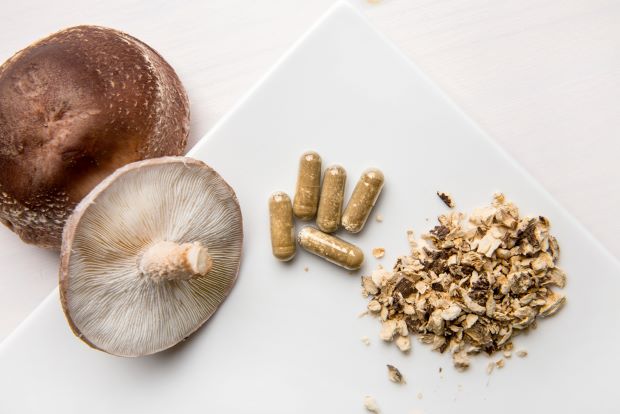
A study was conducted on 30 patients who were diagnosed with chronic fatigue. They were all found to have high antibody levels for Epstein–Barr virus (EBV) and/or human herpes virus 6 (HHV6) or Cytomegalovirus (CMV), so were or had been infected by these viruses. The level of natural killer (NK) cells was low in these patients, and NK calls represent the first line of defence against cancer cells and viral infections. However, after taking a Coriolus versicolor mushroom product for 60 days, their NK levels increased by a massive 35% So this species of mushroom could potentially be an effective treatment for both chronic fatigue and cancer.
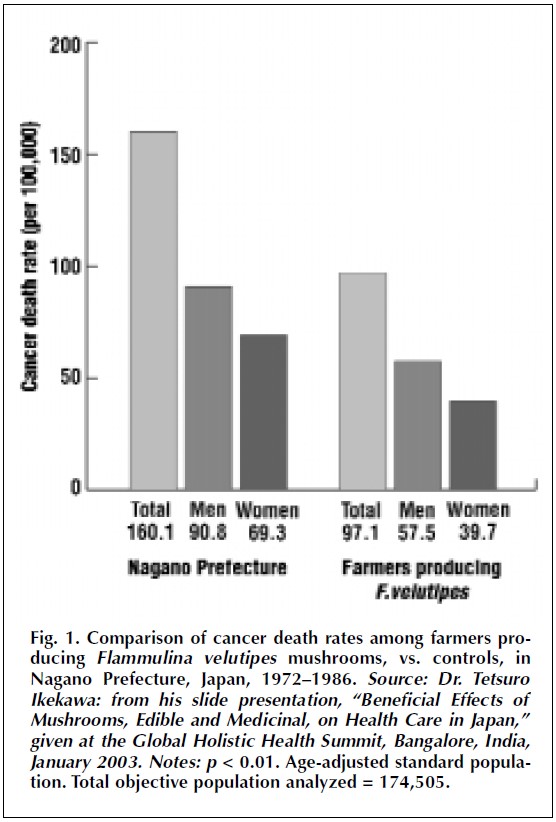
Another study found the edible mushroom Flammulina velutipes to have cancer-prevention effects. A 15 year epidemiological study of 174,505 individuals was conducted in the Nagano area of Japan, where the mushroom is grown. The study compared the cancer death rates of farmers who grew the mushroom with those of a control group, the assumption being that the farmers would eat some of the mushroom they grew. Results showed a cancer death rate in the control group of 160 per 100,000, compared with 97 per 100,000 among the mushroom farmers. (So the control group were 65% more likely to die of cancer than the farmers.)
In addition, the National Cancer Center Research Institute of Japan has established that the basidiomycetes group of edible mushrooms can have anti-cancer activity.
Whilst none of these or the many other studies are able to prove conclusively that cancer can be successfully treated with mushrooms, the right type of mushrooms can certainly improve the immune system, which in turn may help reduce the risk of cancer developing, or possibly act as a treatment. The varieties of mushrooms that have been shown to have this effect may one day become a significant weapon against this disease.
*Please note: Taking any supplement, herb or food should never be a reason not to have regular medical treatment for a serious condition, including cancer.
Always consult with a highly trained and experienced health professional before undertaking a course of supplementation that could make a significant difference to your health.
We are currently offering a limited number of free Comprehensive Assessments. (Terms and conditions: the Assessment is a completely free service, with no obligations whatsoever.)
The Assessment helps to identify:
If you would like to book in for an Assessment, please give us a call on 3376 6911, or you can book online using the link at the top of the page.
Be well, and have a great life!
Certain probiotics could help women lose weight and keep it off, according to a recent study published in the British Journal of Nutrition.
Various studies have previously shown that that the intestinal flora of obese individuals differs from those of thin people. This may be because a diet high in fat and low in fiber promotes certain bacteria at the expense of others.

A Professor Tremblay and his team performed a study to determine if taking probiotics could help reset the balance of the intestinal microbiome in favor of bacteria that promote a healthy weight.
125 overweight men and women completed a 12-week weight-loss diet, followed by a 12-week period aimed at maintaining their body weight.
Throughout the entire study, half the participants swallowed 2 pills daily containing probiotics from the Lactobacillus rhamnosus family, while the other half received a placebo.
After the 12-week diet period, researchers observed an average weight loss of 4.4 kg in women in the probiotic group and 2.6 kg in the placebo group.
However, no differences in weight loss were observed among males in the two groups.
“We don’t know why the probiotics didn’t have any effect on men. It may be a question of dosage, or the study period may have been too short,” says Professor Tremblay, who is also the Canada Research Chair in Environment and Energy Balance.
After the 12-week maintenance period, the weight of the women in the placebo group had remained stable but the probiotic group had continued to lose weight, for a total of 5.2 kg per person.
In short, women consuming probiotics lost twice as much weight over the 24-week period of the study.
Researchers also noted a drop in the appetite-regulating hormone leptin in this group, as well as a lower overall concentration of the intestinal bacteria related to obesity.
According to Angelo Tremblay, probiotics may act by altering the permeability of the intestinal wall. By keeping certain pro-inflammatory molecules from entering the bloodstream, they might help prevent the chain reaction that leads to glucose intolerance, type 2 diabetes, and obesity.
Please note- every person’s body is different, so there is no single approach that works well for everyone. Weight loss is complex issue, and it is likely that there will be a number of imbalances in each person’s body that will be factors behind them putting on weight.
As with any condition, in order to get results it is crucial to first investigate the cause of the problem. We are currently offering a limited number of free Comprehensive Assessments. (Terms and conditions: the Assessment is a completely free service, with no obligations whatsoever.)
The Assessment helps to identify:
If you would like to book in for an Assessment, please give us a call on 3376 6911, or you can book online using the link at the top of the page.
Be well, and have a great life!
An international collaboration, led by the University of Melbourne and Deakin University, has stated that evidence is rapidly growing that there is a strong connection between diet quality and mental health.

In an article published in The Lancet Psychiatry, leading academics stated that psychiatry should now recognise and embrace diet and nutrition as key factors in mental health.
Lead author, Dr Jerome Sarris from the University of Melbourne and a member of the International Society for Nutritional Psychiatry Research (ISNPR), said psychiatry is at a critical stage, as the existing treatments have only resulted in modest benefits.
“While the determinants of mental health are complex, the emerging and compelling evidence for nutrition as a key factor in the high prevalence and incidence of mental disorders suggests that nutrition is as important to psychiatry as it is to cardiology, endocrinology and gastroenterology,” Dr Sarris said.
“In the last few years, significant links have been established between nutritional quality and mental health. Scientifically rigorous studies have made important contributions to our understanding of the role of nutrition in mental health.”
The review showed that nutrient-based prescriptions have the ability to assist in the management of mental disorders. Studies show that many different nutrients have a clear link to brain health, including omega-3s, B vitamins (particularly folate and B12), choline, iron, zinc, magnesium, S-adenosyl methionine (SAMe), vitamin D, and amino acids.
“While we advocate for these to be consumed in the diet where possible, additional select prescription of these as nutraceuticals (nutrient supplements) may also be justified,” Dr Sarris said.
Associate Professor Felice Jacka, a Principal Research Fellow from Deakin University and president of the ISNPR noted that many studies have shown associations between healthy dietary patterns and a reduced level of depression and suicide.
“Maternal and early-life nutrition is also emerging as a factor in mental health outcomes in children, while severe deficiencies in some essential nutrients during critical developmental periods have long been implicated in the development of both depressive and psychotic disorders,” she said.
A systematic review published in late 2014 has also confirmed a relationship between ‘unhealthy’ dietary patterns and poorer mental health in children and adolescents.
Naturopaths have long been aware of the importance of diet and nutrition to treat and prevent a broad range of mental health issues, including anxiety, depression, high stress, sleep problems, brain fog, cognitive decline, etc. A top naturopath will be aware of all of the latest research, and will be highly skilled in the treatment of these and other mental and emotional disturbances with diet and nutrients. Rather than just advise a collection of recommended nutrients, they will individually assess each person and tailor a particular prescription just for them.
For more information on the article, visit https://www.sciencedaily.com/releases/2015/01/150129104217.htm .
If you are having any mental or emotional difficulties, we offer a free Comprehensive Assessment, to help identify
(Terms and conditions: the Assessment is a completely free service, with no obligations whatsoever.)
If you would like to book in for an Assessment, please give us a call on 3376 6911, or you can book online using the link at the top of the page.
Be well, and have a great life!
Antioxidants are important natural substances that help prevent damage to cells in the body. A huge variety of chemical reactions constantly take place inside the cells in our bodies, and sometimes these reactions form by-products known as free radicals. A certain amount of free radicals are needed by the body; for example, some are used by your body’s immune system to attack viruses or bacteria.

However, if free radicals build up in your body, they can cause ‘oxidative stress’. This can damage your cells and impact your health. For example, oxidative stress can affect your
Antioxidants are able to prevent the negative effects of these free radicals by neutralising them.
Sperm have a special outer layer made up of polyunsaturated fatty acids, which help them penetrate and fertilise the egg during conception. However, free radicals damage this outer layer, and also reduce the sperm’s motility (ability to swim properly). As a result, the fertility of the male is reduced.
An even more significant effect of free radicals is the direct damage they cause to the DNA contained in the sperm. Sperm lack the DNA repair proteins that can stop this oxidative damage, so they are helpless to prevent this occurring. This leads to DNA fragmentation, and the majority of sperm with fragmented DNA cannot mature and fertilise an egg. However, if a sperm cell carrying damaged DNA did manage to reach and fertilise an egg, it is very likely that the resulting genetic mutations would cause a miscarriage or even birth defects. Whilst the likelihood of this occurring is low, we feel it is prudent for men trying to have a baby to reduce activities that increase free radicals in their body, and to take a high quality antioxidant supplement, preferably one that is specific for protecting the health of the sperm.
An increase in free radicals can be due to alcohol consumption, poor nutrition, air pollution, electromagnetic waves, insecticides, and obesity. (One study reported severe abnormalities and molecular alterations in the sperm of men who lived in polluted areas. And recent research showed that the Mediterranean diet helps to improve male infertility and reduce the cancer risk caused by environmental pollutants.)
There are many different types of antioxidants, and they all have a different way of protecting the body. A combination of various antioxidants works best, and ideally the combination should be designed to help prevent the free radical damage to specific cells. (That is why a specific antioxidant formula is recommended by optometrists and eye specialists for people with macular degeneration, for example.)
One of the key antioxidants for protecting sperm is zinc. Zinc supplementation has been shown to protect sperm against oxidative damage, and as a result, improve semen function. For example, when 60 infertile men with abnormal levels of oxidation were given zinc supplements for three months, the oxidised levels within their semen returned to normal. Zinc also helps to increase the number of sperm, so it is beneficial to both the quality and quantity of the sperm. However, zinc is only one of a number of antioxidants needed for healthy sperm, and a trained naturopath will be able to identify which are most important for each individual.
If you are considering having a baby or actively trying to have one, we offer a free Comprehensive Assessment, to help identify
(Terms and conditions: the Assessment is a completely free service, with no obligations whatsoever.)
If you would like to book in for an Assessment, please give us a call on 3376 6911, or you can book online using the link at the top of the page.
Be well, and have a great life!
When a person’s life revolves around their health problems, it can sometimes become demoralising and affect their day-to-day confidence. Their problems can chew up their time, interfere with their work, impact on their social life, and even affect their relationships with family and friends.
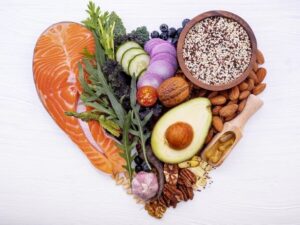
‘Jim’ (not his real name) is in his mid-40’s, and came to us as he suffered from high blood pressure and just could not lose weight. There was a history of Fatty Liver in his family.
Jim has always been health conscious and had a reasonably good diet and exercise routine. Despite this, his blood pressure was high for the past two years. It became worse after he caught COVID, and he was fatigued for weeks after that. His emotional and mental wellbeing were affected, his constipation and reflux worsened, and he developed dandruff and dry skin.
He saw one of our naturopaths, who reviewed his blood tests. These showed chronic inflammation markers, which can lead to long term health issues. Inflammation that continues for longer than it should can result in damage to tissues, organs, and body systems. Chronic inflammation has been known to cause Diabetes, and in Jim’s case he was found to have borderline Type 2 Diabetes as a result. Excess weight that is very difficult to shift can also be caused by long-term inflammation.
Jim’s blood tests indicated that inflammation was also occurring in his liver and large intestine as well as his pancreas. This inflammation (together with the weight gain caused by the inflammation) had resulted in his high blood pressure.
The blood test also showed that his low-fat weight loss diet was contributing to his chronic inflammation. Many types of dietary fats or oils can cause inflammation, however the right essential fats will act to reduce it instead. In Jim’s case, a high carbohydrate to protein intake was making the inflammation worse.
Jim was keen to lower his blood pressure, and was happy to make some changes to his diet. Our naturopath placed him on a treatment plan that addressed his digestive and liver health, and lowered his inflammation.
After only 2 months, Jim’s blood pressure was back in normal range and his digestion was working very well. He also lost over 10 kg in weight, particularly around the abdomen. His lean body mass was also good, which is an important benchmark for healthy ageing.
Please note- high blood pressure is a dangerous condition, and so lowering your medication should only be done once your pressure has come down far enough, and with the approval of your doctor.
As with any condition, in order to get results it is crucial to first investigate the cause of the problem. We are currently offering a limited number of free Comprehensive Assessments. (Terms and conditions: the Assessment is a completely free service, with no obligations whatsoever.)
The Assessment helps to identify:
If you would like to book in for an Assessment, please give us a call on 3376 6911, or you can book online using the link at the top of the page.
Be well, and have a great life!

In a recent large-scale Phase 3 trial1 by the University of Sydney, a group of people who previously had basal cell carcinomas or squamous cell carcinomas were given a form of Vitamin B3 for 12 months.
The results made international headlines when the study found that the number of new
In addition, the number of pre-cancerous actinic keratosis lesions were reduced by 13%, and there was also a decrease in the number of these lesions forming.
(In another study, the same version of B3 has been shown to reduce solar keratoses by about 35% after two months of treatment.)
How Does B3 Reduce Skin Cancer Risk?
When your cells are working as they should, your DNA instructs your cells to grow normally. However, UV radiation from the sun can damage the DNA in your skin, and this damaged DNA results in the creation of skin cancers.
The good news is that this research shows that B3 may help to reduce the risk of skin cancer by helping the DNA repair itself.
(The study did not look at whether the rate of melanomas was also reduced, however anecdotal evidence from a local skin doctor, who is a Fellow of the Skin Cancer College of Australasia, suggests that it has a similar effect on this type of skin cancer as well.)
For those who have been previously diagnosed with BCC or SCC, the benefits of vitamin B3 could literally be life-changing. However, it is important to note that a certain type of B3 (nicotinamide) and a certain dosage was needed to obtain these results. So to help prevent skin cancer, nicotinamide should be given as a high-dose treatment rather than just as a basic supplement.
If you have had a skin cancer, or have a family history of it, or if you just want to try and prevent any skin cancers developing, we suggest making an appointment with one of our naturopaths. Or even better, book in for a free Comprehensive Assessment first, so that we can gain a very detailed understanding of your body and how it is functioning, allowing us to precisely tailor any treatment you may have. (Terms and conditions- the Assessment is a completely free service, with no obligations whatsoever.)
Be well, and have a great life!
1https://www.ncbi.nlm.nih.gov/pmc/articles/PMC4570055/
Broccoli is not everyone’s favourite food, but it is known to have many health benefits. For example, research has shown that increased consumption reduces the risk of cancer and type 2 diabetes.

In a recent study, researchers found that broccoli contains certain molecules that bind to a receptor and help to protect the lining of the small intestine. If this lining is compromised, it can lead to a number of digestive and immune problems, including abdominal pain, bloating, gas, irritable bowel syndrome (IBS), food intolerances and allergies.
For more information on how a poor lining of the small intestine can result in food intolerances or allergies, please visit https://www.cntc.com.au/why-a-good-immune-system-is-so-important-for-you/ .
For more on the research on how broccoli protects the lining of the small intestine, visit https://www.sciencedaily.com/releases/2023/04/230406152639.htm .
If you have any gut issues, we offer a free Comprehensive Assessment, to see what is going on in your body, what is causing the problem, and the best way to treat or prevent it. (Terms and conditions- the Assessment is a completely free service, with no obligations whatsoever.)
Be well, and have a great life!

Last year it was estimated that around 400,000 Australians suffer from dementia, and this number is expected to double by 2058.There is no effective treatment using pharmaceutical drugs, however there have been a number of studies showing the effectiveness of natural therapies for this condition.
One study, showed that increasing your magnesium intake is likely to “lead to less age-related brain shrinkage, which is associated with better cognitive function and lower risk of delayed onset of dementia in later life”. See more on this study by following the link below.
Magnesium plays an essential role in nerve transmission and nerve-muscle interaction. It also protects nerves against excessive stimulation, which can damage or even kill nerve cells, and cause many types of neurological disorders. Due to its importance to the nervous system, research continues to be conducted on its role in preventing or treating migraines, chronic pain, epilepsy, Alzheimer’s, Parkinson’s, stroke, epilepsy, anxiety and depression.
If you have a health issue, or have a family history of a health problem and want to prevent it, we offer a free Comprehensive Assessment, to see what is going on in your body, what is causing the problem, and the best way to treat or prevent it. (Terms and conditions- the Assessment is a completely free service, with no obligations whatsoever.)
Be well, and have a great life!
In China, mung beans are a very popular food, especially in the hot summer months, and grown in almost all the provinces. Most families eat mung beans in their diet and use them widely in different recipes, such as mung bean noodles, mung bean cake, mung bean rice, mung bean soup, mung bean desserts and even mung bean wine. Mung bean soup is an extremely popular dish in the hotter months, as it is used to help cool the body by helping it regulate the body temperature more effectively.
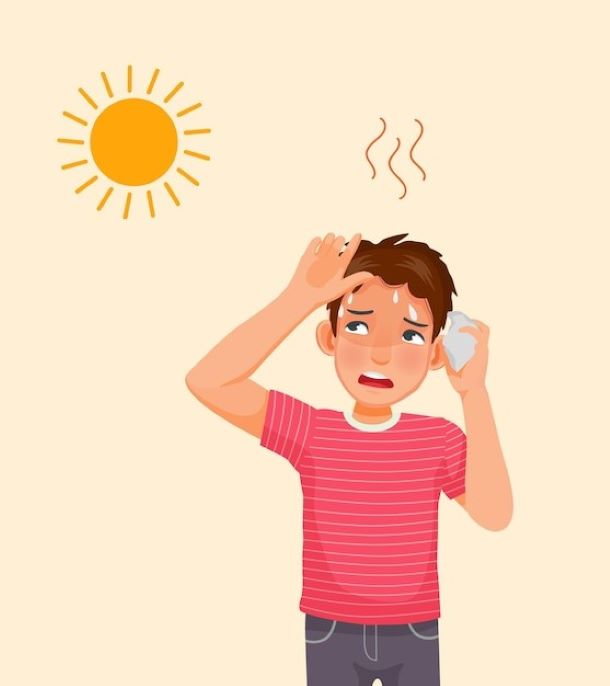
In Chinese medicine, if the weather is very hot, the body may absorb more heat from its external environment. If the body cannot release enough of this ‘summer heat’ by itself, symptoms such as feeling hot and sweaty, lethargic, lack of energy, headache, dizziness, or even heat stroke may occur.
Mung beans have a cooling effect, and they have been shown to regulate body temperature and to help prevent heat stroke. Cooked mung bean drink or soup is best kept refrigerated, which helps to keep it fresh and increases its health effects.
Recipe 1 (drink)
This recipe is suitable to clear body heat and prevent heat stroke during a hot summer. Drinking two or three cups a day will help to release the ‘summer heat’ from the body.
Ingredients
Instructions
Drink this thin soup as required. The beans can also be eaten if soft enough.
Recipe 2 (soup)
Takes 40 minutes and serves 4.
Ingredients
Instructions
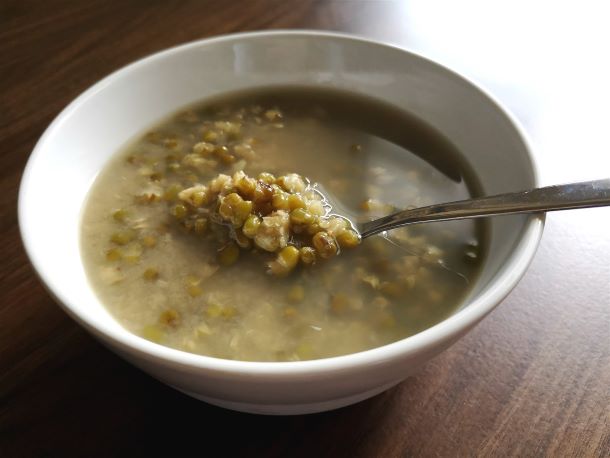
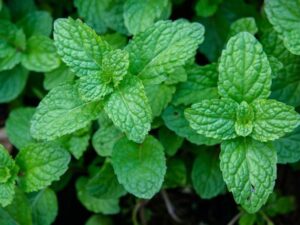
Peppermint tea is a common herbal tea that many people drink, including those trying to become more healthy by staying away from tea and coffee. However, even though it is natural and used by any people it is not necessarily good for you.
Peppermint tea has my benefits, including
However, as with any foods that have a strong flavour, too much can be a bad thing. Because of its actions of cooling and relaxing the stomach and intestines, regular use of peppermint can result in a weakened and ‘cold’ digestive system, causing symptoms such as
So peppermint is best used when it is needed, and not on a regular basis.

Valued at $120, your Assessment will help to uncover:
All this will be fully explained to you, and you can ask as many questions as you like. That way we can be sure to give you all of the right information, understanding and advice you need. Terms and conditions: This is a free, no obligation offer.